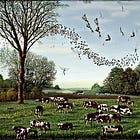looking into nostalgia’s mirror: bittersweet, fond-ish, social reflection
"The past is a foreign country; they do things differently there"
introduction
“We used to have to get up out of the shoebox at twelve o'clock at night, and LICK the road clean with our tongues. We had half a handful of freezing cold gravel, worked twenty-four hours a day at the mill for fourpence every six years, and when we got home, our Dad would slice us in two with a bread knife.”
The Four Yorkshiremen - ‘The good old days’
“But you know, we were happy in those days, though we were poor.
Aye. BECAUSE we were poor. My old Dad used to say to me, “Money doesn’t buy you happiness.”
‘E was right. I was happier then and I had NOTHIN’. We used to live in this tiiiny old house, with greaaaaat big holes in the roof.”
Don’t they just love trying to outdo each other with their nostaligic recollections of the bad old times - but because they were the old times, have through the magic of selective, reconstructive recall - they have become the ‘good old times’? Of course, none of them actually want to go back, do they? Mental time travel is plenty enough for them.
I had the great experience of being one of the speakers on a One Dublin, One Book panel entitled ‘Deep Pools of Nostalgia’ with poet, Peter Sirr, and novelist, Belinda McKeon. I wrote up notes on nostalgia and memory ahead of time, and expand them here. Nostalgia, and especially its weaponisation, is an important theme of my book, Talking Heads.
looking back

Nostalgia often arrives as a bittersweet blend of affectionate exaggeration and genuine longing; it is a multifaceted psychological phenomenon, deeply rooted in our biology and culture.
Once diagnosed as a potentially fatal “homesickness” among 17th-century Swiss mercenaries, nostalgia is now seen as an adaptive emotion that bolsters well-being, forges social bonds, and sustains a coherent sense of narrative self.
But it has a dark side, too, because it can also be easily weaponised (as we will see below).
Nostalgia is a complex emotional experience blending of memory, emotion, and cognition. It is often characterized by a sentimental longing for the past, typically for periods or places with happy personal associations.
Neuroimaging studies have revealed many of the brain systems and networks involved in nostalgia, showing the interplay between memory retrieval, emotional processing, and reward mechanisms.
Some readings, with more below the line
psychological dimensions of nostalgia
By bringing past and present together, nostalgia reveals itself as a wonderful, if dangerous, emotion - by longing for that which has gone, it traps you in something that can never be again, but by merging nostalgia with thinking about the future, it can help shape how you approach tomorrow and tomorrow and tomorrow - what you might yet become.
Reading list below also.




